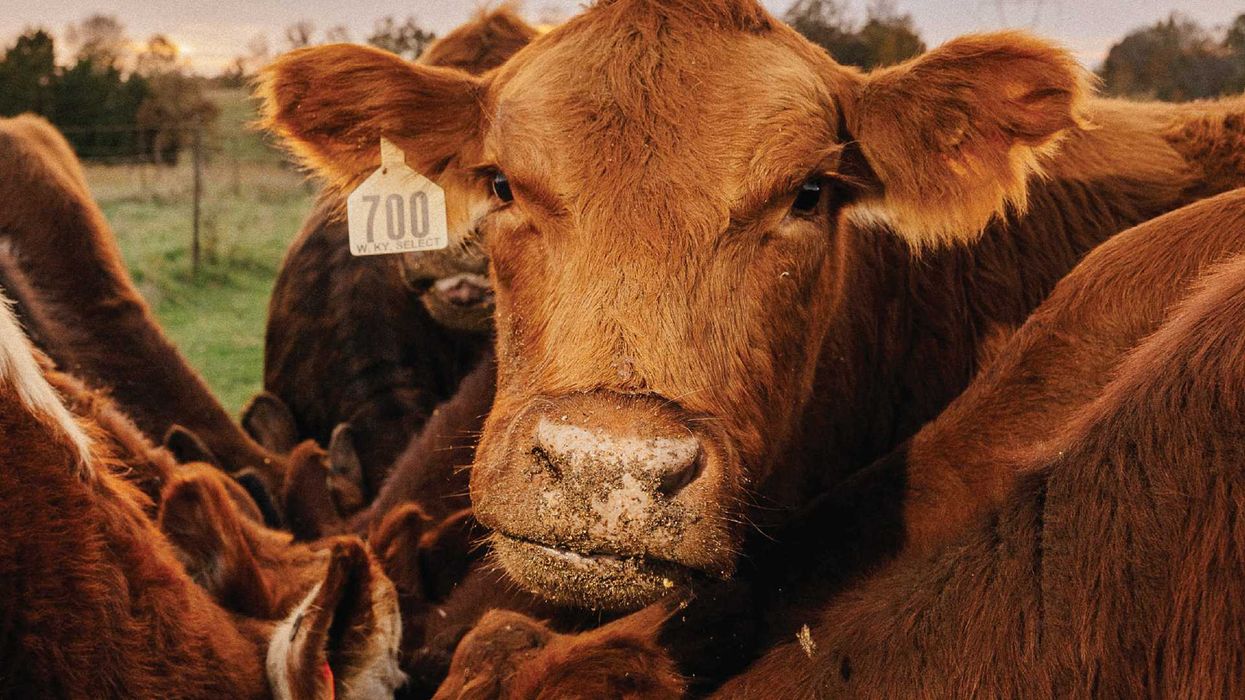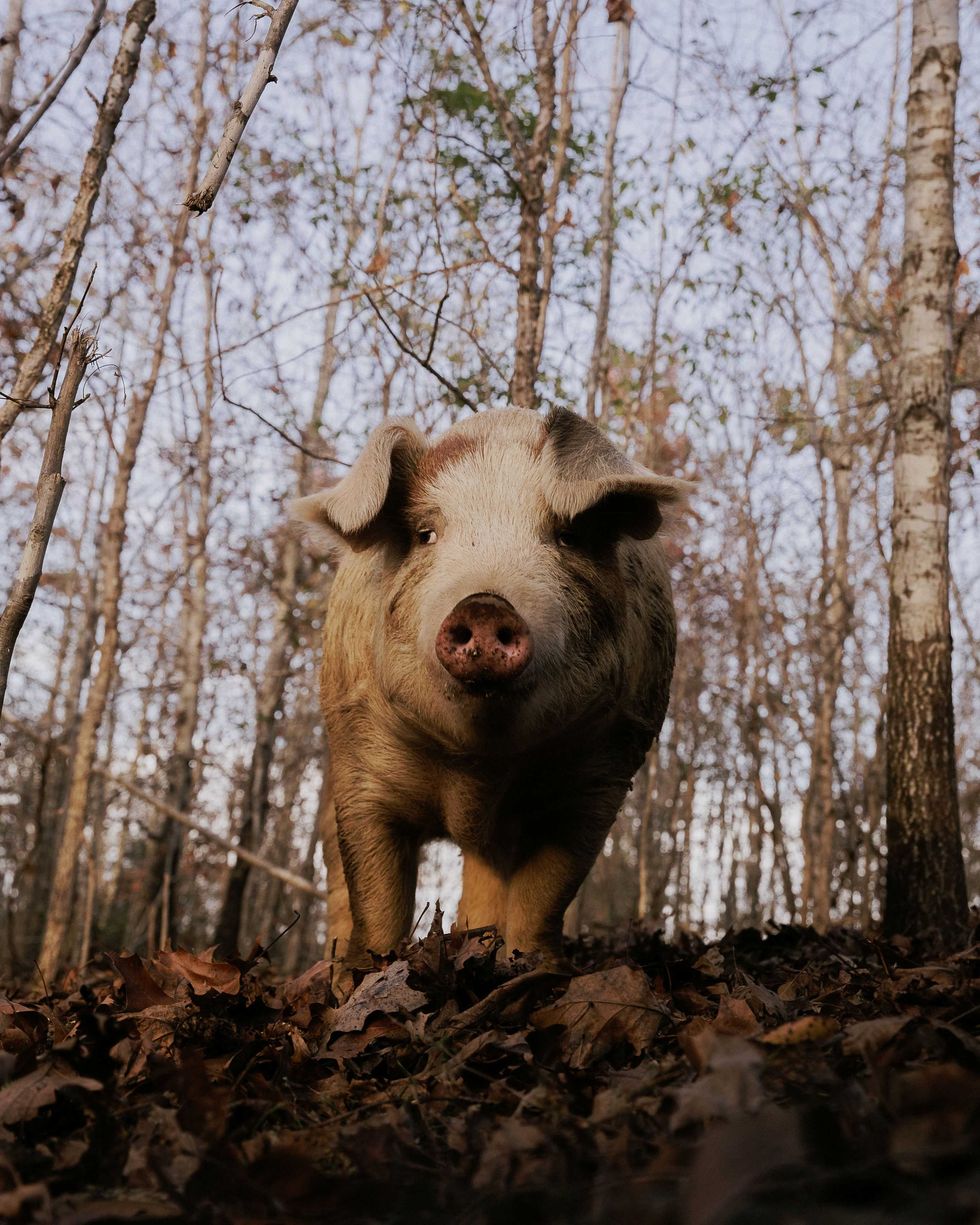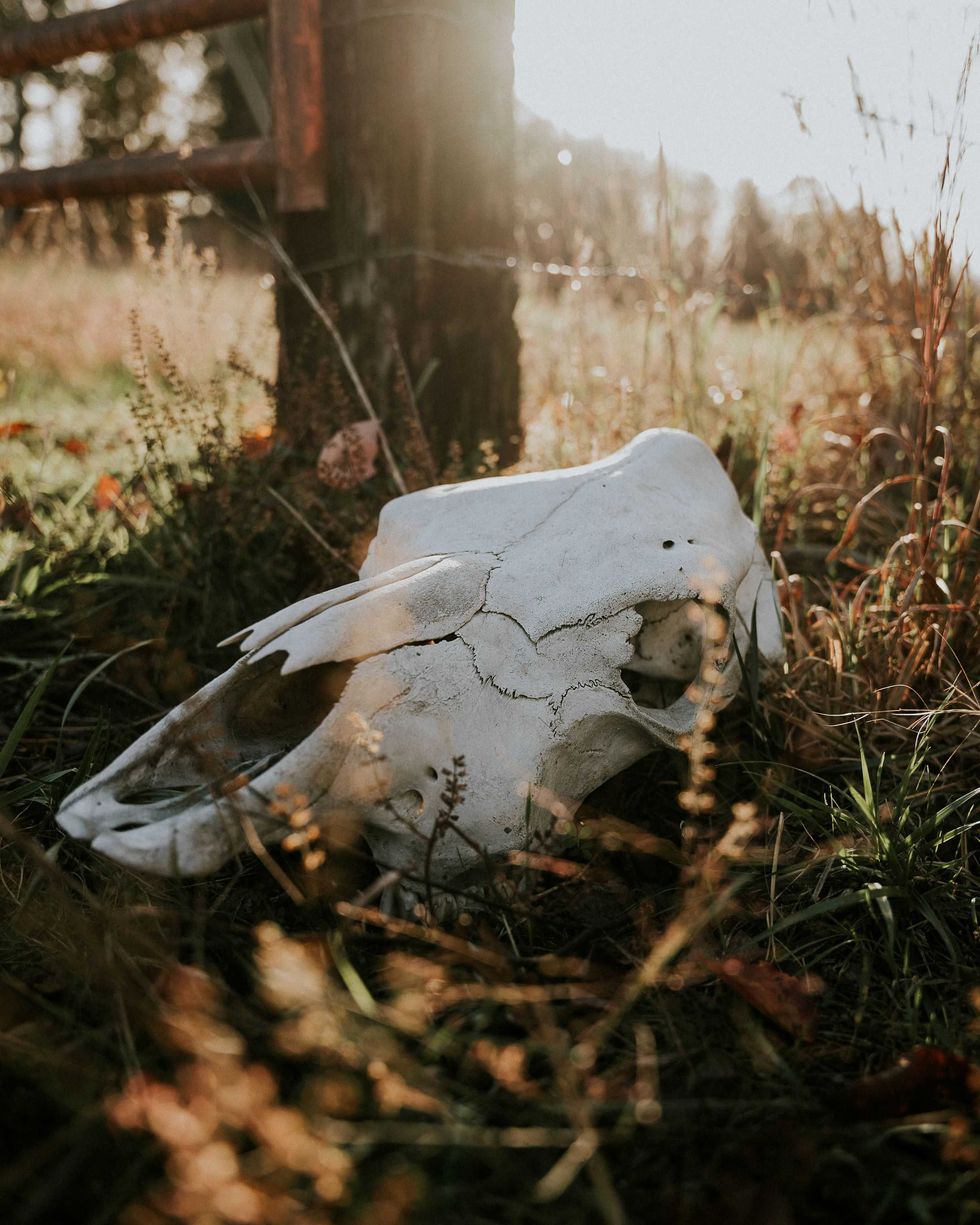
Bovines against the backdrop of Tennessee's gentle green.

The new wave of urban refugees can't go country if the country's all gone.
I’ve lived in rural Tennessee, or at least close to it, my whole life. Will my three children live here? I don’t know. I’m not sure there will be a Tennessee left for them. At least not one that resembles the place I grew up in.
I was raised on a 26-acre property my dad bought for about $75,000 in 1988. I spent much of my early years exploring the woods, wading through the creek, shooting at beer cans, and picking off copperheads with a pellet gun. We’d go catch catfish in my grandma’s pond. They’d be so hungry you could hook them with cigarette butts. I’d venture into the woods with my grandma to hunt for dryland fish and poke salad—the former a rare delicacy, the latter a poisonous weed you only get a taste for if you grew up with nothing better to eat. Usually, what we’d find is a mess of ticks instead.
All that land has long been sold off. And slowly but surely, that way of life is disappearing. Tennessee is losing 200 acres of farmland every day. It seems like every time I drive the backroads, I find a plot of land that was once a family farm that has been hacked to pieces and strewn with houses—built as quickly and as cheaply as possible. Since 2020, over 300,000 people have moved to this state, mainly to Nashville and Knoxville, with most coming from California and Illinois. This influx has caused property prices to skyrocket. Before it was a “hot city,” Nashville used to be a cheap place to rent, but that’s no longer the case. The locals have been priced out, and now they’re joined by newcomers from California. For many of them, the country means little, and they prefer being in the city. Their houses are just places to store their stuff while they go about their business around Nashville.
In 2017, my wife and I moved out of the city limits to a little, five-acre property. I wanted my only child at the time to have at least a taste of what I experienced growing up. I paid $144,000 for it, and was irate because it was $4,000 over the asking price. I chuckle about that now. Today, Zillow tells me it’s worth over $300,000, and I’m sure I could get a lot more than that. I guess I should be happy about my property value doubling, but I’m not. If I had to do it over again today, I couldn’t afford it, which also means that most of the kids growing up here won’t be able to afford it, either.
The per capita income in this county is just about $27,000. It’s the same old story—the factories left, and the drugs came in. People here have never been rich, butat least at one time they owned family land and the freedom of the outdoors, with enough places to hunt, fish, and farm to feed themselves—if only barely.
People often point fingers at Bill Gates, BlackRock, and the Chinese, but sometimes, the real enemy is within. You have developers who grew up here, understand what it means, then buy a farm and turn it into a suburb. They’ll sit around staring into their coffee, muttering about how it just isn’t country anymore. Do they realize they’re selling their birthright for a bowl of pottage? Would they even recognize that reference these days?
For many of our local elected officials, chopping up their neighbors’ farmland to divvy it out to Californians is progress, and they’ll tell you that to your face. Of course, they’re usually getting a cut. The thing about local government is that it doesn’t pay much, and it’s a lot of hassle. You either have to be a retiree with a lot of free time on your hands or someone who stands to gain from calling the shots.

“Bottom line is it’s all about money,” as Macon County commissioner Philip Snow says. “Developers and land speculators don’t care about the neighborhoods.”
At least it’s easy to understand their motivations. You can buy a large plot of land for $400,000, slap down 20 houses for $100,000a piece, and then sell each plot for $250,000. In one deal, you’ll make more money than a lifetime of farming.
For some, it’s about revenge more than money. They don’t like the land or their neighbors. They wish they lived in Los Angeles or New York but got stuck in the sticks as an act of cruel fate. This is the infamous “hicklib.” Country on the outside, big city liberal on the inside. They live lives of quiet embarrassment, jumping at any opportunity to impress (or at least emulate) the big city folks. Case in point: In a nearby county, the ostensibly conservative Chamber of Commerce was caught working with a George Soros-backed group to lock out conservative Christian business owners.
Others aren’t hicklibs but are equally embarrassed by their surroundings, so the result is practically the same: Living life with a chip on their shoulder, putting on pretentious airs to ward off any appearance of being a hillbilly. Most of them are hardworking people who just want their kids to have a better life, but the tragedy is, they don’t realize that their pretensions only make them look more ridiculous, like a middle-aged man with shoe polish in his hair or a cheap toupee. They would get more respect from the real upper crust by leaning into who they are. Authenticity isas precious a commodity as land.
Unfortunately, many of our newcomers quickly learn they don’t even like the place. Tennessee has never been a land for soft people. The land is angry and full of briars. The soil is thin and hard, with rocks as big as your head. At the peak of summer, the air is so hot and humid that you’ll struggle to take a full breath. This is a land that could only have been settled by a people as tough and stubborn as the Scotch-Irish. We tend to stick close to family, with friends being a secondary consideration, if one at all. Your church is as much a part of your identity as your blood.
If you meet an old-timer, expect to give a complete account of your family tree. Who’s your mama? Who’s your daddy? Where did they grow up? Where did they go to church? What about cousins? For the older generations, this is how they get to know you and your connection to this place. Increasingly, folks don’t have such connections, and that can be a bit isolating. And often, that breeds resentment.
Some become full-on activists, hoping to terraform Tennessee into New California. They might succeed, but not for the reason they think. What will kill this culture won’t be activism but dilution of the population through the loss of the land that forged it. People as ornery as they were honest, who’d give you the shirt off your back but slap you for insulting their mama, who made up for the harsh earth and the utter poverty with a good sense of humor and a can-do attitude.
What remains of that culture is dying out, bulldozed to make way for the same sort of people you see anywhere—just one big homogenous blob, fed by YouTube videos and cable TV. Recently, my six-year-old told us he wants to learn the banjo. My wife is a musician and has a lot of connections, but despite that, she cannot find a teacher for him here in the foothills of Appalachia. The few banjo players left are either too old or uninterested.
I can’t say I’m much better. I definitely don’t play the banjo. I grew up a tech-obsessed city boy at heart, but the older I get, the more I lament the loss of what was. For better or worse, we had an identity. We had a cuisine and a culture that were uniquely ours. And over the years, I’ve witnessed how the government and the whole world have treated my neighbors. Stripped of simple, honest work, flooded with foreigners who refuse to integrate, abandoned to a plague of drug addiction, while far-off elites laugh at us.
We were convinced to do much of the dirty work ourselves, raised more to loathe our culture than to respect it. Our parents saw a better world on TV and wanted that world for us. In 1971, CBS canceled its very successful line of rural TV shows, mainly out of spite. Veteran actor Pat Buttram quipped that “CBS canceled everything with a tree in it.”

For the older generations, it was hard to see gleaming skyscrapers on TV and look outside to see wooden shacks. These days, many of our great Midwestern cities are in ruins while people flock here. They never liked us very much, but they always liked our land.
We never had much, but what we had were real things, and real things seem hard to come by these days. If you want to fish, you can go to the city park, but it’s not the country—real fishing holes are getting harder and harder to find. I set up to hunt in my woods last fall only to hear my new neighbors blasting a radio and yelling at the top of their lungs.
Slowly, the walls of civilization close in and push out the wild, the country, the only real reason to even live here. We don’t have an interstate. We don’t have a shopping mall, if those are even a thing anymore. What we have, or had, was freedom. Reality.
My Southern sense of fatalism tells me the modernizers will eventually win, since they have all the power and money. But I never cared much for that attitude, and I think it’s the source of so many of our problems. I’ve seen teenagers say, “It’s so over for me,” when it hasn’t yet even begun. The old folks like to sit out the window and say it ain’t what it was. Maybe not, but I ain’t ready to die yet.
Maybe I’m just stubborn. All I know is: If you have land, do all you can to hold onto it. They ain’t making any more.
Josh Centers is the editor-in-chief ofAllOutdoor.com, OutdoorHub.com, and The Firearm Blog. He lives with his wife and children on a five-acre property in rural Tennessee.
Josh Centers